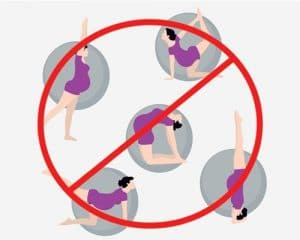When planning exercise during pregnancy, many questions usually come to mind. Physical exercise is an activity that can improve or maintain physical health and overall health. This kind of pregnancy workout routine is very important; it can help solve some common pregnancy discomforts and even help you prepare for labor and delivery.
Table of Contents
- What are the Benefits of Exercise During Pregnancy?
- Is it Safe to Exercise During Pregnancy?
- Can You do Squats While Pregnant?
- When Should a Pregnant Woman Start Exercising During Pregnancy?
- How Much Exercise do You Need During Pregnancy?
- What Kinds of Workouts are Safe during Pregnancy?
- Exercises to Avoid During Pregnancy?
- Activities that may Cause you to Hit the Water Vigorously
- Activities that may make your body temperature too high
- When Should you Stop Exercising?
- When can you Start Exercising Again After Giving Birth?
What are the Benefits of Exercise During Pregnancy?

Exercising for 30 minutes on most days can benefit your health during pregnancy. It is still beneficial to exercise for only 20 minutes a week (3 or 4 days a week). The important thing is to get active and make blood flow.
Here are some of the benefits that you might get from exercising during pregnancy:
Regular exercise can also help you stay healthy during pregnancy and may improve your ability to cope with childbirth. This will make it easier for you to get back in shape after the baby is born and good thing is that you can do your pregnancy exercises at home.
Is it Safe to Exercise During Pregnancy?
With your healthcare provider’s consent, exercising during pregnancy is safe for you and your baby. When you have a prenatal checkup for the first time, ask your provider what activities are safe for you. If you have certain health conditions or pregnancy complications, exercising during pregnancy may not be a good idea.
Can You do Squats While Pregnant?
During pregnancy, squats are an excellent resistance exercise that can maintain the strength and range of motion of the hips, gluteal muscles, core and pelvic floor muscles. If done correctly, squats can help improve posture and may help the delivery process.
When Should a Pregnant Woman Start Exercising During Pregnancy?
In the second trimester (14th to 27th weeks), your bumps will get bigger and bigger, and now you may consider exchanging high-impact sports (such as running and jumping) for low-impact activities (such as walking or swimming) good time.
If your pregnancy is healthy, exercise will not increase the risk of miscarriage, premature babies (born before 37 weeks of pregnancy) or low birth weight (less than 5 pounds and 8 ounces). Miscarriage is when a baby dies in the uterus before 20 weeks of pregnancy. Premature babies and low birth weight babies are more prone to health problems at birth and later in life than other babies are.
How Much Exercise do You Need During Pregnancy?
Aerobic exercise refers to the activity when you repeatedly move large muscles such as arms and legs. Aerobic exercise can make you breathe faster, deeper, and make your heart beat faster.
Moderate intensity means you are active enough to sweat and increase your heart rate. Brisk walking is an example of moderate-intensity aerobic exercise. If you cannot speak normally during the event, it may be that you have worked too hard.
You don’t have to complete all 2½ hours at once! Instead, break it down into a week. For example, do 30 minutes most or all day. If it sounds like it, please do 10 minutes of active activity 3 times a day to spread the 30 minutes.
What Kinds of Workouts are Safe during Pregnancy?
If you are healthy and you exercised before pregnancy, you can usually continue to be active during pregnancy. Please confirm with your health assistant. For example, if you are a runner or tennis player, or do other types of strenuous exercise, you may be able to continue exercising while pregnant. As your abdomen becomes larger in the later stages of pregnancy, you may need to change some activities or reduce the intensity of exercise.

If your doctor says you can exercise, choose an activity you like. If you did not exercise before you became pregnant, now is a good start. Discuss security activities with your doctor and start slowly. Try to build your own health little by little. For example, start with 5 minutes of activity every day and go to 30 minutes every day.
These activities are generally safe during pregnancy:
#1 Walk:
A fast walk is a good exercise method that will not strain your joints and muscles. If you are not familiar with sports, then this is a great activity.
#2 Swimming and water sports:
Water can support the weight of your growing baby, and moving towards it helps keep your heartbeat faster. The joints and muscles are also easy. If you have back pain during other activities, try swimming.
#3 Ride a stationary bicycle:
riding a regular bicycle during pregnancy is safe for you. Even if your belly is getting bigger, a stationary bicycle is good for you as compared to a regular bicycle.
#4 Yoga and Pilates classes
Tell your yoga teacher that you are pregnant. She can help you adjust or avoid positions that may be unsafe for pregnant women, such as lying on your abdomen or flat back and can assist you for pregnancy exercises in the first trimester. Some gymnasiums and community centers provide prenatal yoga and Pilate’s classes only for pregnant women.
#5 Low-impact aerobics class
Low-impact aerobics will not cause too much fatigue to your body like high-impact aerobics. In low-impact aerobic exercise, you always step on the ground or equipment with one foot. Examples include walking, riding a stationary bicycle, and using an elliptical machine.
In high-impact aerobic exercise, both feet leave the ground at the same time. Such as running, skipping rope, and doing jacks. Tell the teacher that you are pregnant so that she can help you modify your exercise regime as needed.
#6 Strength Training
Strength training can help you build muscles and strengthen bones. As long as you are not too heavy, you can exercise safely. Ask your provider how much you can lift.
You don’t need to attend a gymnasium or have special equipment to be active. You can walk in a safe area or exercise videos at home. Or find ways to be active in daily life, such as doing yard work or going upstairs instead of taking an elevator.
Exercises to Avoid During Pregnancy?

When choosing an event, please be careful and contact your provider. During pregnancy, please do not:
#1 Jumping:
Any activity where jumping will cause you to fall, such as horse riding, downhill skiing, cross-country biking, gymnastics, or skating, Any sport that can hit the abdomen, such as ice hockey, boxing, football, or basketball
#2 Sit-ups and other Exercises that Makes you Lie Down (after the third month of pregnancy):
When you lie on your back, the uterus puts pressure on the veins, allowing blood to enter your heart. Lying on your back may cause a drop in blood pressure and restrict blood flow to the baby.
Activities that may Cause you to Hit the Water Vigorously
Such as water skiing, surfing, or diving
#1 Skydiving or Scuba Diving:
Scuba diving can cause decompression sickness. This is when dangerous bubbles form in the baby’s body.
#2 Unless you Live in a High-Altitude area, Exercise in a High-Altitude Area (over 6,000 feet):
Altitude refers to the height of an object above the ground. For example, if you are in a high altitude area, you may be in a mountainous area. Exercising at high altitudes during pregnancy reduces the amount of oxygen reaching the baby.
Activities that may make your body temperature too high

Hot yoga or outdoor exercise on hot and humid days. You do hot yoga in a room with a temperature set between 95 F and 100 F.
This is not safe for pregnant women because it can cause hyperthermia, which can happen when the body temperature is too high. It proves that spending too much time in the sauna or hot tub may make your body temperature too high and increase the risk of giving birth to a baby with birth defects.
To be safe, do not spend more than 15 minutes in the sauna at a time or spend no more than 10 minutes in the hot tub at a time.
When Should you Stop Exercising?
When you are doing physical exercises, please drink plenty of water and pay attention to your body and feelings. If you have any of the following signs or symptoms, stop the activity and call your provider:
When can you Start Exercising Again After Giving Birth?
Ask your health provider when you can resume exercise:


Leave a Reply